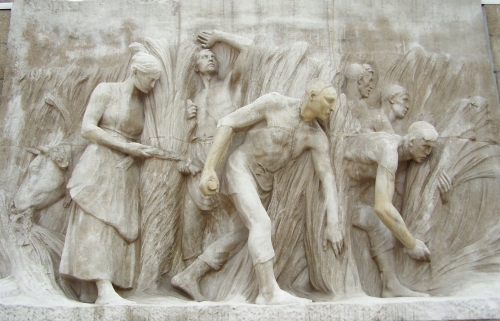The French President stepped on a rake for the second time, and was duly slapped in the face by its long handle. French products went off the shelf in the Arab and Turkish shops; heads chopped off in the midst of pandemics; a lot of animosity, anger, smacking of a civil war. Vous l’avez voulu, you asked for it, Emmanuel Macron! We saw it in 2015, why did you push “Replay”? Anyone can step on a rake once, but to repeat this mistake? It is not a sign of a smart guy, unless this response is exactly what he wanted.
Macron is surely a smart guy. He had a few good practical reasons to provoke French Muslims. Not an ideological man, he wanted to steal the right-wing electorate of Mme Le Pen. They are known for hating foreigners, first of all the large Muslim population of the republic. The Muslims do not fit the self-image of a Frenchman, the slim man in beret and mackintosh with a baguette under his arm. It was not hard to make this Muslim population angry, and then to manifest Macron’s iron fist in dealing with them, and voila! the nationalist voters are in the pocket of the French president.
The replay was jumpstarted by Charlie Hebdo. This small satirical magazine of little artistic value usually publishes bad taste cartoons of public loo wall quality. It wouldn’t survive but for grants and government subsidies. It is so minor that it would not be noticed either but for the mainstream media that bring its message to the last immigrant banlieue. Now they have republished some nasty cartoons aimed at the Prophet Muhammad. The immigrants and their children didn’t enjoy this premeditated insult to their faith. Think about having a good laugh over the Holocaust in the presence of a Jewish person and you’ll understand. Even peaceful and calm people dislike being offended. However, the publication was of little importance, as opposed to Macron’s public and well-covered support for it. He positively celebrated this publication and added a few well-chosen and offensive phrases against Islam. This was the ringer.
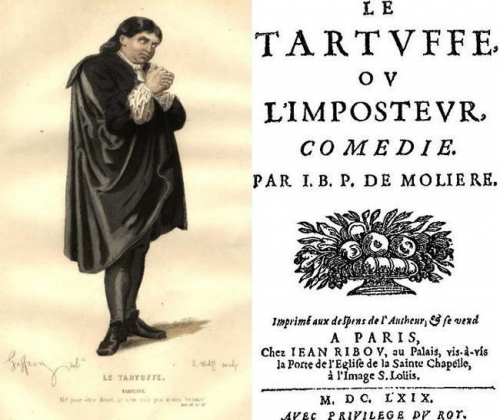
Tartuffe would be proud of Macron who declared that Charlie Hebdo is the true carrier of the French Republican spirit and its love for unbridled freedom of speech. It would be bad enough if true, but it is not. France, and the entire world, is now in the middle of a huge offensive against free speech. Facebook banishes accounts and removes posts, Google shadow bans sites, the venerable Unz.com has been both banned on Facebook and shadow-banned on Google. President Trump has his tweets removed or appended with a health warning on Twitter. The proposed new hate law of Scotland would make it a crime to express opinions likely to cause discomfort even within the four walls of your own home. For a long time it has been a crime to say “hateful things” in the public space, and in the UK there are a hundred thousand “hate crimes” a year committed, according to the thought police.
France is leading the assault against free speech. French Writer Hervé Ryssen Jailed for Criticizing Jews;French Court Sentenced Alain Soral to Pay Jewish Organization $158,500 for Re-Releasing 128-Year-Old Book – say the recent headlines. The new French law bans “hate speech” on social media. The law obliges platforms and search engines to remove offensive content – including religious bigotry – within 24 hours or risk a fine of up to €1.25m. This law, and other hate laws are applied in defence of Jews, but strangely do not defend Muslim or Christian sensibilities.
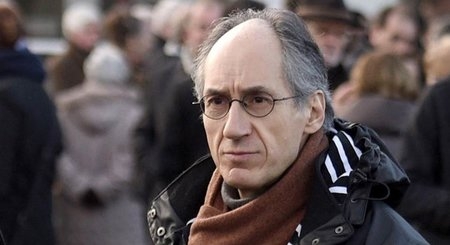 The chief editor of Charlie Hebdo is aware of this discriminatory order and approves of it. A Spiked journalist reports on meeting him: “Biard[the editor] is not in favour of unregulated speech. He supports French laws that outlaw Holocaust denial, and is sympathetic towards laws on hate speech. He approves of prosecution of French comedian Dieudonné, who has been arrested numerous times for saying the Shoah wasn’t important.” You may not speak against Jews, but attacking the faith of poor Muslim immigrants is perfectly all right, for they are people of no importance, and they should learn who is their boss and what is the true faith of their new homeland (a hint: it is not Christianity). If they make trouble it is even better for they can be hit hard.
The chief editor of Charlie Hebdo is aware of this discriminatory order and approves of it. A Spiked journalist reports on meeting him: “Biard[the editor] is not in favour of unregulated speech. He supports French laws that outlaw Holocaust denial, and is sympathetic towards laws on hate speech. He approves of prosecution of French comedian Dieudonné, who has been arrested numerous times for saying the Shoah wasn’t important.” You may not speak against Jews, but attacking the faith of poor Muslim immigrants is perfectly all right, for they are people of no importance, and they should learn who is their boss and what is the true faith of their new homeland (a hint: it is not Christianity). If they make trouble it is even better for they can be hit hard.
Theoretically, it is illegal in France to insult Muslim (or Christian) beliefs. The European Court of Human Rights had ruled so explicitly in a judgment in the case of Otto-Preminger-Institut v. Austria: “The respect for the religious feelings of believers guaranteed by Article 9 can legitimately be considered violated by provocative images of objects of religious veneration, such images can be considered a malicious violation of the spirit of tolerance, which should also be a feature of a democratic society.”
In the case of Wingrove v. the United Kingdom:
“… Respect for the religious feelings of believers can become the basis for the state’s legal restriction of the publication of provocative images of objects of religious veneration.”
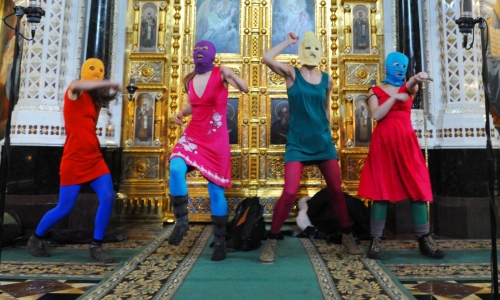
In the case of Pussy Riot v. Russia:“Given that the applicants’ presentation took place in a cathedral, which is a place of religious worship, the Court considers that (the State’s) interference can be regarded as having the legitimate aim of protecting the rights of third parties.”
Such activities should be illegal, but apparently are not. This unfairness is a source of aggravation: Muslims were laughed out of court when they complained against particularly vile Charlie’s cartoons, but Jews almost always win when they go to court against their denigrators. (Full disclosure: I was also sued by LICRA, the French Jewish body, while my French publisher was financially devastated by their Lawfare).
Thus, France (like the rest of the West) has very little freedom of expression left, and Macron’s claim that Charlie cartoons should be celebrated as a sign of Liberté sounds particularly hypocritical and false, like George Bush’s They hate us for our Freedom. As if that weren’t enough, then came the push to make every Muslim in France aware of this Macron-approved Charlie nastiness. In schools, a lesson was dedicated to educating children in the crude pornography of the cartoons. It was claimed (and I have no way of verifying) that the murdered French teacher had shown cartoons mocking the Prophet for five years every year since 2015, as he did this year after Macron’s speech. He allegedly added another pornographic cartoon and suggested Muslims might leave the classroom if they did not want to be offended. I can imagine the cry (selection! deportation!) if a teacher had suggested that Jewish pupils should leave the room. The upset Muslim parents went to the police and complained. The teacher lodged a counter-complaint alleging defamation. It is difficult to judge now whether the slain teacher was acting as he was obliged to by the authorities, or whether he was especially zealous in delivering the smut.
An 18-year-old youngster of Chechen origin (he had lived in France since he was six) killed him and allegedly decapitated him, and right away the killer was shot dead by police. This created a wave of panic in France, with Macron and Le Pen competing with calls to punish the Muslims. Some Muslim extremists allegedly attacked worshippers in a Nice church and killed three or four of them. This was decried as a false flag action, aimed at terrorising people into accepting the new lockdown, by a prominent radical French site that called for the “refusal of re-containment (or new lockdown) as the only real act of resistance in these troubled times”.

It could be a false flag, for no Muslim group accepted responsibility, and besides, the French secret service has a tradition of killing the perpetrators they sent to do the deed, and the killing of the young Chechen fits their playbook. The next terrorist act, the shooting of a Greek Orthodox priest in Lyon, was also ascribed to bloodthirsty Muslims, until it was discovered that the criminal was a fellow Orthodox ex-monk with some personal grudge against the priest; then the Lyon attack was dropped into the memory hole.
Macron still closed all the churches in France; apparently the government wanted to create the background for a religious war of Christians vs Muslims. Even murkier is the reason why the Chechen rebels/terrorists have been brought to France, as well as Syrian, Libyan and Afghan refugees/terrorists who participated in the bloody civil wars in their lands. They were certainly dangerous.
We know that British intelligence used Libyan refugees with a dubious background to keep meddling in Libyan affairs, and two terrorists, Salman and Hashem Abedi, fled Libya with British government assistance onboard the UK Royal Navy vessel, HMS Enterprise, only to kill and injure many Brits in 2017 in Manchester. We know that the Russians have asked to extradite suspected Chechen terrorists from England and France, but were refused.
It is not likely that these hardened terrorists have been brought to Western Europe in hope of turning them into exemplary citizens, or for humanitarian reasons. It is more probable that they were brought in exactly for the purpose of creating a terrorist underground network, to frighten citizens into obedience. Just like coronavirus, but in another way. Some people are getting killed, but the purpose is achieved: new anti-terrorist acts are enacted and acted upon; more surveillance is introduced. The governments and their security services want to keep us scared, and terrorism is a reliable means for that. It is all part of the war the elites carry out against the nations and against too-unreliable democracy.
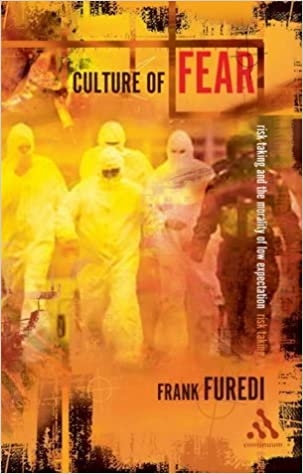 Elites are unhappy with us, the people, says Frank Furedi: “Contempt for the people who fail to vote in accordance with their betters’ wishes is one of the main drivers of elite hostility towards democracy today.” They hope “coronavirus will kill populism”, read: democracy, he adds.
Elites are unhappy with us, the people, says Frank Furedi: “Contempt for the people who fail to vote in accordance with their betters’ wishes is one of the main drivers of elite hostility towards democracy today.” They hope “coronavirus will kill populism”, read: democracy, he adds.
You can trust politically incorrect Russians to say it straight. The Russian top banker Herman Gref in his candid speech at SPIEF 2012 said what his Western partners think but never would utter:
“I want to tell you that you are actually saying terrible things. You are proposing to transfer power into the hands of the people. But if people would know all, it will be extremely difficult to manipulate them. People don’t want to be manipulated when they have knowledge. That’s why Kabbalah was a secret teaching for three thousand years. Any mass control implies a manipulation element. How to live, how to manage such a society, where everyone has equal access to information, everyone has the opportunity to receive directly information unless it had been processed through government analysts? How to live in such a society? Your reasoning makes me scary.”
Herman Gref had been injected with a truth serum, people said after hearing his candid talk. (Here in Russian). Perhaps.
Perhaps the very idea of mass immigration from the war-stricken regions was connected with the elites’ desire to start a low-intensity civil war in their own country while undoing social cohesion achieved by centuries of living together.
Now we shall proceed to a deeper reason why Macron decided to splash some oil onto the ever-glimmering bonfire of strife.
A fluent ideologue of French far-right nationalism is Eric Zemmour, an Algerian Jew. Here is a short article in English giving some background to the man. The Irish Times mistakenly calls him “the son of Jewish “Pied-Noirs”, who emigrated from Algeria when it gained independence from France”. This isn’t so: Pied-Noirs were French colonists in Algeria, while Zemmour is a native Algerian Jew. Instead of being an assimilated Jew as he claims, he is rather a dissimulating Jew: despite being an advocate for Catholic France, he goes to a synagogue, avoids pork and keeps kosher (Jewish dietary laws) at home, but not outside. He says he was a leftist until he discovered Muslims and started his own warfare against them.
He is, and has been, allowed to say such things on French mainstream TV channels for which anybody else would be arrested and imprisoned. He calls for putting an end to immigration (which is reasonable) but he does not stop at this, but speaks of mass deportations, and actually calls for a civil war against French Muslim citizens, while presenting himself as a defender of Catholic France.
His official opponent, the ideologue of liberal France, is Bernard Henri Levi, BHL, another North African Jew, who was instrumental in creating civil wars in Syria and Libya while encouraging Islamist fanatics in these lands to overturn the secular socialist regimes. He is a supporter of immigration, and he lives part of the year in Marrakech, Morocco.
These two Jews are leading France to religious strife, acting on both sides of the divide. Doesn’t it remind us of a Rothschild and a Trotsky, a ruthless banker and a fiery revolutionary, who incited class conflicts from both sides of the social divide, as G.K. Chesterton saw it?
 This is the view of a Moroccan-French author, Youssef Hindi, a friend and a co-worker with Alain Soral. He has asserted that Jews have systematically infiltrated Muslim and Christian elites in order to stimulate destructive wars between Muslims and Christians, for the benefit of Jews alone, who will thus be able to settle in the Holy Land, drive out the original inhabitants, and establish a world empire of nations obedient to Jerusalem, which is the ultimate content of Jewish Messianism. Hindi’s West and Islam has the caption “Messianic sources and the genesis of Zionism from medieval Europe to the Clash of Civilizations”.
This is the view of a Moroccan-French author, Youssef Hindi, a friend and a co-worker with Alain Soral. He has asserted that Jews have systematically infiltrated Muslim and Christian elites in order to stimulate destructive wars between Muslims and Christians, for the benefit of Jews alone, who will thus be able to settle in the Holy Land, drive out the original inhabitants, and establish a world empire of nations obedient to Jerusalem, which is the ultimate content of Jewish Messianism. Hindi’s West and Islam has the caption “Messianic sources and the genesis of Zionism from medieval Europe to the Clash of Civilizations”.
According to Hindi, Zionism didn’t begin with Theodore Herzl but has deep roots in the Kabbalistic eschatology of the Middle Ages, conveyed and nourished by successive generations of sages, mystics and miracle workers.
Such a sage was Don Isaac Abravanel (born 1437), a subject of the book by Benzion Netanyahu, father of the Israeli Prime Minister and a cult figure for father and son alike. He launched the era of Jewish messianism, says a Haaretz writer. His idea, absorbed and accepted by Benjamin Netanyahu, was the calling for an apocalyptic catastrophe, a “war of the monsters” between Gog and Armilus – symbolising Ishmaelites (Muslims) and Christendom (as Abravanel described, for example, in his work “MayaneiYeshua”). This war will be concluded with a weakening of both sides and the Rise of Jews to world domination, symbolically called ‘The Feast of the Leviathan.’
Carl Schmitt, the great philosopher of his time, said in 1942, that Jews enjoy the colossal global struggle between the monsters, Leviathan (Britain and the US) and Behemoth (Germany): “They gleefully rub their hands waiting for the mutual attrition that would enable the Jews’ domination of the world, or ‘The Feast of the Leviathan.” Will the war between Islam and Christendom now brewing in France allow for the next Feast of the Leviathan?
Perhaps. Avner Ben-Zaken, an Israeli thinker, wrote in his excellent treatment of the subject (here in English) that Benjamin Netanyahu, himself a great adept of Catastrophic Messianism and a believer in the war of Edom and Ishmael as the key to salvation of Jews, visited France in the aftermath of the first Charlie episode and encouraged the French Jewish leadership to act by calling them a “new collective Isaac Abravanel”. Two years later, the French Jewish leadership appointed Emmanuel Macron the President of the Republic, says a French Jewish writer blogging under the name Tsarfat (the Hebrew name for France).

In a long and detailed piece Tsarfat tells of a few prominent Jews (Alain Minc, Serge Weinberg, Jacques Attali, and Bernard Mourad) vouching for Macron with David de Rothschild. In 2011, Macron became a junior partner at Rothschild, earning a substantial salary. He was worth every penny – he tricked Le Monde, he cheated President Hollande, he cheated the French state, he did whatever Rothschild demanded and in return, he has got the presidency of the Republic. He was the new king appointed by the new Abravanel. Now he has to deliver the war between Christendom and Islam, for the supreme glory of Israel.
Eric Zemmour, the fiery far-right spokesman, a commenter with its own prime-time slot on a major TV channel, is the ideal man to lead the psychotic (thanks to Corona panic) France (and Europe) into a religious war between Christendom and Islam. In the war, both major opponents will be broken and weakened, while Israel with its Judaism-for-Goyim, the Holocaust creed will have the upper hand.
Eric Montana, a French Christian journalist wrote: “Zemmour is a double agent in the service of the Clash of Civilizations and of the Zionist movement which feeds a climate of permanent tension in France. Zemmour works to provoke division and pour fuel on the fire, by outrageously criminalizing some of our compatriots of Muslim faith, and thus endangering civil peace in our country. Zemmour is a public danger who despite his numerous convictions for inciting racial and religious hatred, remains scandalously present in the media, undoubtedly enjoying protection invisible to the naked eye … but yet very real.”
At least we can say that the opponents of Muslims aren’t Christians. For the Charlie Hebdo magazine is explicitly anti-Christian as well as anti-Muslim. One finds there some most obnoxious cartoons offending the Virgin and Christ, as well as the pope and the Church. (They never offended Jews, somehow).
A Christian government would act like the Russians did. A few years ago, Pussy Riot profaned the St Saviour of Moscow in the way that Femen had profaned some great European cathedrals, from Notre Dame de Paris to Strasbourg. The Russian government did not wait for vigilante justice to be meted upon the viragos, but had gave them up to two years of prison. At the same time, the Russian criminal law has been changed to include ‘sacrilege’ among ordinary crimes, by general consent. Since then, such crimes do not occur.
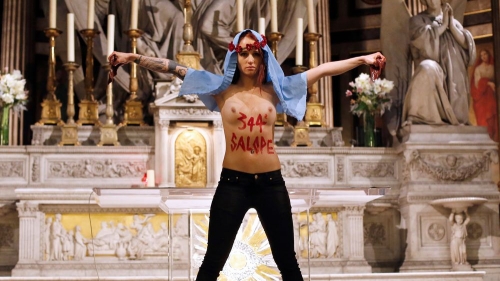
In Charlie’s France, the Femen despoiling the churches were never punished; but a churchwarden who tried to prevent that was heavily fined. France has a long anti-Christian tradition, usually described as “laic” (secular), and its grand anti-Church coalition of Atheists, Huguenots and Jews coalesced in the days of the Dreyfus Affair. It also has a strong Catholic church, but not one calling for a war with Muslims.
The true Christian view of the developments was expressed by Archbishop Theodosius Atallah Hanna of Sebaste in Palestine (he baptised me in 2002). He condemned the targeting of Muslims in France and around the world through degrading paintings and cartoons. “Hate speech aims at serving the policy of divide and conquer. Christians and Muslims must cement a culture of brotherhood and togetherness and we must work together, more than ever before to defeat all the plans and conspiracies that aim at dividing us and at creating discord in our ranks”, said the Palestinian bishop.
P.S. Much attention is given to the exotic way of killing by the alleged terrorists. Actually, beheading is as French as onion soup. Guillotine was the preferred national method of execution (like electric chair in the US). The French beheaded their king and queen. During the Battle for Algeria, French paras famously played football with chopped rebel heads. Napoleon had brought beheading to the Middle East, not vice versa. During his campaign in Egypt, general Bonaparte having learned of an uprising in a village had ordered his adjutant Croisier to go there, surround the entire tribe, kill all men without exception, and bring women and children to Cairo. His orders were promptly carried out. Many children and women who were driven on foot died on the way, and, a few hours later, donkeys laden with sacks appeared on the main square of Cairo. The sacks were opened and the heads of the executed men of the guilty tribe rolled across the square, wrote the historian. Should we say chicken came home to roost?
Israel Shamir can be reached at adam@israelshamir.net
This article was first published at The Unz Review.




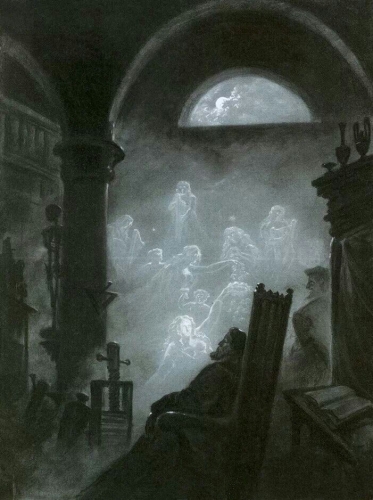

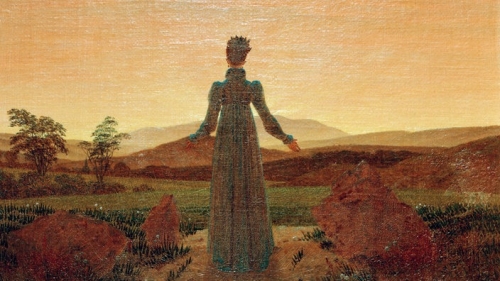
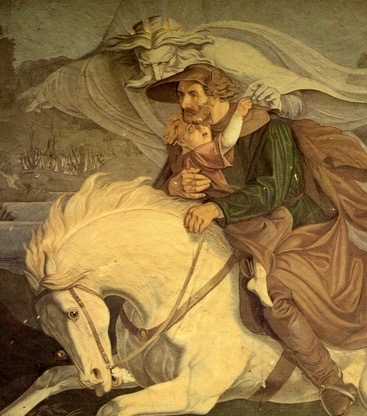
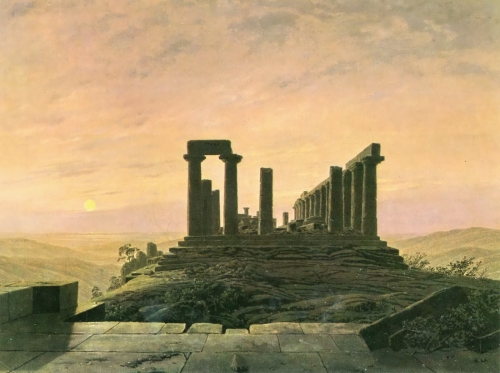
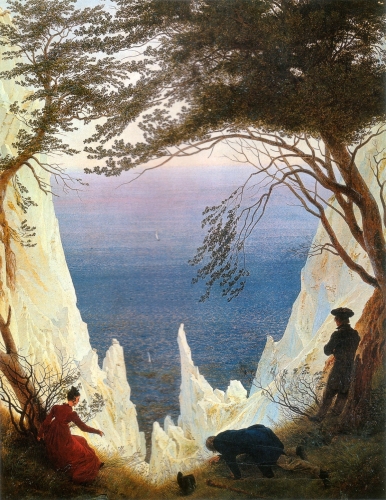

 del.icio.us
del.icio.us
 Digg
Digg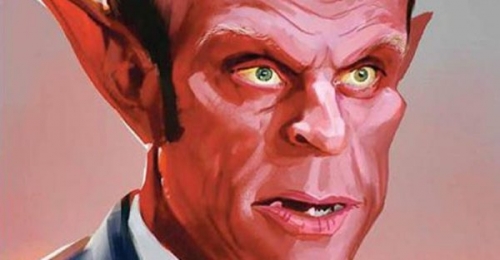
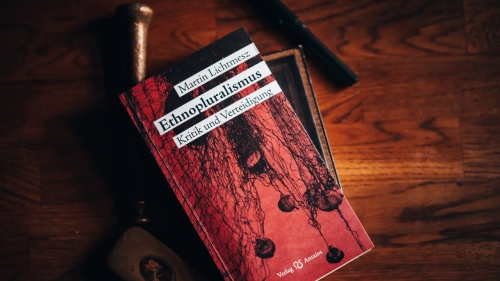
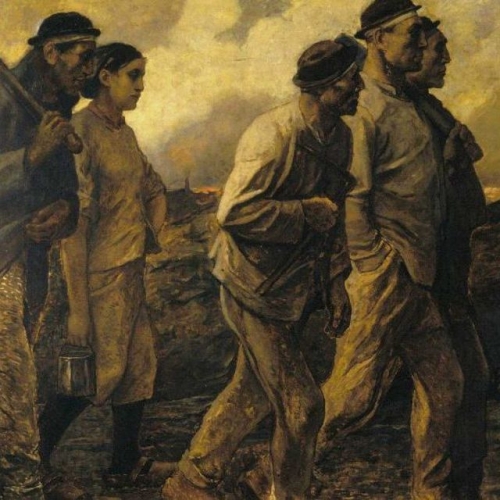
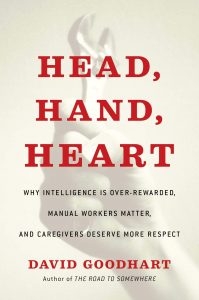 David Goodhart
David Goodhart Vocation
Vocation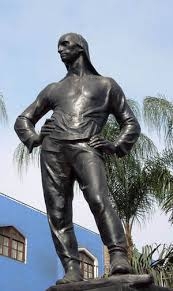 The three top professions are medicine, the law, and the clergy. If you feel called to do any of these jobs, don’t pass them up. As far as enlisting, I must state upfront that there are many ways to serve your country outside of the infantry. Some further advice on this can be found
The three top professions are medicine, the law, and the clergy. If you feel called to do any of these jobs, don’t pass them up. As far as enlisting, I must state upfront that there are many ways to serve your country outside of the infantry. Some further advice on this can be found 